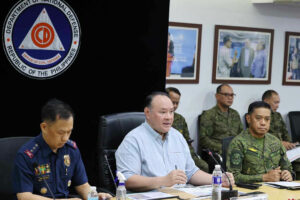182 proposed laws up for President’s signature

SENATE PRESIDENT Vicente C. Sotto III on Tuesday said close to 200 bills approved by Congress are awaiting the signature of outgoing President Rodrigo R. Duterte, whose term ends by noon of June 30.
He told reporters in a news briefing that “pending in the Office of the President are 182 bills passed by both houses of Congress.”
During the 18th Congress, 197 bills were signed into law, including five relating to tax reforms.
This number does not include local bills, which may put the total of signed legislation to over 500, according to Mr. Sotto. “We’re only talking about the bills of national importance.”
One was vetoed, the proposed SIM Card Registration Act.
The outgoing Senate leader said among the “urgent” bills that are up for the President’s approval are:
— Separate Facility for Heinous Crimes Inmates Act;
— National Transportation Board;
— Special Protection Against Online Sexual Abuse and Exploitation of Children; — Vaporized Nicotine Products Regulation Act;
— Expanded Anti-Trafficking in Persons Act;
— Permanent Validity of Live Birth, Death and Marriage Act;
— Act strengthening the Office of the Corporate Council; and
— Agriculture, Fisheries and Rural Development Financing Enhancement Act.
Other pending bills include adopted resolutions concurring with the ratification of treaties, international agreements and conventions.
Mr. Sotto cited the ascension to the Convention on Temporary Admission, the ascension to the 1961 Convention on the Reduction of Statelessness, and ratification of the Arms Trade Treaty.
For the Regional Comprehensive Economic Partnership (RCEP), which the Senate failed to give its concurrence to before it adjourned sine die despite repeated appeals from economic managers and business groups, Mr. Sotto said he believes it will be ratified in the next Congress.
“With the incoming president as secretary of agriculture, we might be ready for RCEP.”
The RCEP, which entered into force on Jan. 1, is a trade agreement involving Australia, China, Japan, South Korea, New Zealand and the 10 members of the Association of Southeast Asian Nations (ASEAN).
The Philippines is one of three countries that have not ratified the RCEP, along with Indonesia and Myanmar. — Alyssa Nicole O. Tan




